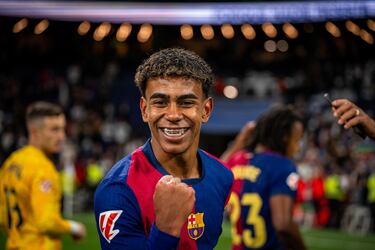Real Madrid forced to sign players after Clásico failure
The club’s embarrassing defeat to Barcelona has highlighted the gaps in their squad.

Clásicos always have consequences, and any match against Barça carries significant weight for Real Madrid. This is even more true after last Saturday’s debacle at the Bernabéu, a crushing 0-4 defeat that widened the gap with their eternal rivals to six points (plus the head-to-head goal difference, which Flick’s team can practically consider won).
This defeat also left deep wounds in Real Madrid’s project for the season. Though results had been favourable so far, the team’s form had already been inconsistent. The first clash with the title favourites has now cast doubt on the project’s overall strength. However, as Álvaro Benito pointed out after the match, the timing may work in Madrid’s favour: “The blow is so significant, and there’s still so much left to play for, that it might force a necessary reality check.”
And the reality is that Madrid‘s weaknesses were exposed during the Clásico—not in an overt manner, but enough to be noticed. The goalkeeping situation, for example, remains a difficult issue. Lunin was never expected to fill Courtois’ shoes, and while his involvement against Barça was unforeseen, he‘s still a backup.
“Volveré a caer millones de veces pero siempre volveré a erguirme”
— Fede Valverde (@fedeevalverde) October 27, 2024
Porque somos el REAL MADRID y está escrito en nuestra historia 🤍 pic.twitter.com/5nrKAVAsAA
What’s gone wrong at Real Madrid?
In midfield, Madrid once again lacked the cerebral presence they’ve missed since Kroos left, and the club’s decision to replace his creative passing with Mbappé’s goals—though they didn’t materialise in this Clásico—is telling. The attack, however, doesn’t seem to need reinforcement. Madrid has settled into a 4-4-2 system with Vinícius and Kylian up front, supported by a strong bench featuring Rodrygo, Endrick, Brahim, and Güler.
Midfield, though, remains an area of concern. Madrid had the chance to find a player in Kroos' mould last summer but chose not to, leaving Ancelotti to manage with the current options and find a way to restore the team’s fluidity without Kroos orchestrating play.
Where reinforcements seem increasingly necessary is in defence. Madrid appeared fragile against Barça, with several defensive lapses: in the 0-1, Lewandowski outmanoeuvred Militão and Mendy was also at fault for the goal; at 0-2, Militão again struggled with marking the Pole; for the 0-3, Mendy gave too much space to Yamal, who scored with his weaker foot; and for the 0-4, Raphinha tore past Lucas Vázquez.
This defensive collapse was a still-life portrait of horror, one that Madrid has the means to mend, though they’ve been reluctant to do so, as the club maintain they won’t make signings in January.
🎙️ Ancelotti: "Estamos dolidos, es un momento duro y difícil".#ElClásico pic.twitter.com/IHfg1uNx5d
— Real Madrid C.F. (@realmadrid) October 26, 2024
The margin for error, however, was already slim, and now it’s nearly non-existent. Madrid are playing with fire when it comes to centre-backs and know it. They have two reliable starters (Militão and Rüdiger), one (Vallejo) who is currently out of his depth, another (Alaba) dealing with a prolonged injury and an uncertain return, and Tchouaméni as an emergency option. Amidst this defensive chaos, Tchouaméni was one of Madrid’s better performers in the Clásico, particularly in the first half.
Then there’s the right-back situation. Carvajal is out for the season, creating a double problem as he was also Ancelotti’s fallback option for central defence. That leaves Madrid with just four defenders: Lucas Vázquez, Rüdiger, Militão, and beyond them, a gaping void. With a packed schedule that could stretch to 72 matches if Madrid reaches the finals in all seven competitions, there is no safety net.
While results were going Madrid’s way, the club’s stance on avoiding winter signings made sense, especially after last season’s response to Militão and Alaba’s injuries. But the team has now stumbled at the season’s first major hurdle, and with Flick’s Barça amassing 30 out of 33 possible points, Madrid can ill afford more missteps.
The dilemma is well known: winter signings have historically not worked out for Real Madrid, and the options available don’t fully convince the club’s sporting directors.
Who could Real Madrid sign at right-back?
For the right-back position, which Madrid acknowledge will need reinforcement, the most prominent name is Trent Alexander-Arnold. The Liverpool defender’s contract expires in June, and with no renewal in sight, Madrid could take advantage of this to secure him at a lower price. Additionally, Alexander-Arnold’s ability to play in midfield (as he often does for England) adds to his appeal.

Related stories
As for central defence, options like Aymeric Laporte have emerged. Laporte is reportedly eager to leave Saudi Arabia and return to European football, though matching his Al-Nassr salary is a challenge. Other possibilities include youth players, like Mario Gila at Lazio, whose rights Madrid still partially owns.
In any case, these moves would require significant spending—something Madrid may find necessary, especially given that the club’s youth academy, unlike Barça’s, is not currently producing top-level talent, with Raúl’s Castilla team struggling to stay afloat.
Complete your personal details to comment